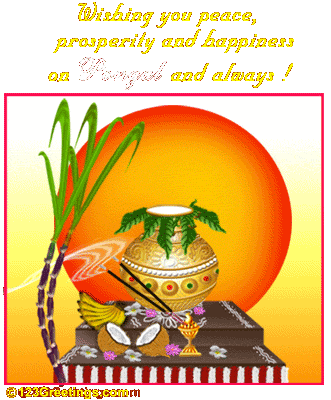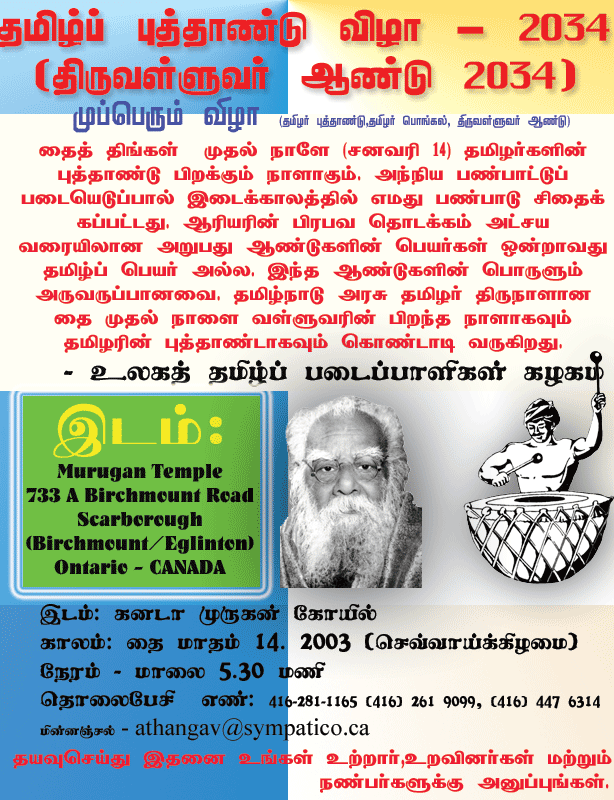
By V.Thangavelu
Thanksgiving is
an important aspect of Thamil culture and tradition, as is the case with many other
civilisations. Most thanksgiving ceremonies are religious in nature, as people of each
culture thank their chosen deity for the favours granted to them, though this is not
always the case.
 The Thamil
festival of Thai Pongal is such a thanks-giving ceremony. It is
a harvest
festival, the equivalent of Canada’s Thanks Giving Day. Thamil farmers
celebrate the event to thank gift of nature like the Sun and the farm animals for their
assistance in reaping a bountiful harvest.
The Thamil
festival of Thai Pongal is such a thanks-giving ceremony. It is
a harvest
festival, the equivalent of Canada’s Thanks Giving Day. Thamil farmers
celebrate the event to thank gift of nature like the Sun and the farm animals for their
assistance in reaping a bountiful harvest.
Thamil New Year 2034 and Pongal festival falls on the first day of the month of Thai of the Thamil calendar (On the 14th of the month of January according to Christian calendar). Thai (January) is the harvest season in both Thamil Nadu and Thamil Eelam.
Interestingly
in Japan too, the harvesting day is celebrated on January 15 of every year and is called "Kosho Katsu".
In 1969 Kalaignar M. Karunanidhi, Chief
Minister of Thamil Nadu, ordered that the day after Pongal should be celebrated as Thiruvalluvar Day all over Thamilnadu. He also declared the
day as a government holiday. The second day
of Thai (Thai thingaL) is celebrated as Thiruvalluvar Day since 1974. Thamilnadu
Government also adopted the Thamil Calendar based on the birth of Thiruvalluvar in 1971,
in government gazette since 1972 and in
all government offices from 1981.
In the solar calendar, January 13/14 has astronomical significance. It is the day the sun after making a complete circle is seen going on its ’ northward journey’ and observed from the earth the sun enters one of the 12 imaginary zodiac sign of Magara Raasi from Dhanu Raasi.
The
celebration of Thai 1st goes back to the latter part of the Sangam age. According to the
Sangam literary work Paripaadal, this day is
related to the Thiruvaathirai festival. Having spent the entire month of Maarkazhi praying
to god and observing ritual fasting, young virgins celebrated the last day, Thai 1, with
the Thai Bathing. According to the work Kaliththokai, the rituals during the
month of Maarkazhi are observed in the hope that it will lead to wedlock with a
good-hearted husband. It also mentions the worship of Sun as a deity.
According
to the stone carvings [kalvettu] at Thiruvotriyoor, Pongal was celebrated during the time
of the great king Raajaraaja Chozhan 1. This festival was known as the “Puthiyeedu”
festival. Puthiyeedu meant the first harvest of the year.
Both
the Maarkazhi month rituals and the Thai 1st bathing rituals are practiced even today. It
was these secular rituals that inspired the
immortal hymns of Thiruppaavai and Thiruvempaavai by Saintess Aandaal and Saint
Maanikkavaasakar respectively in the 9th
century.
Pongal refers to rice
cooked in milk and sweetened with jaggery. On
a full scale it is a three-day festival of nature-worship. On the second day thanks are
offered to the cattle, Mattu Pongal or Paddip Pongal,
which helped farmers to plough the fields, transport goods and provide milk to
drink. On this day the cattle is bathed, decorated and given special gruel. Turmeric, kunkumam are applied to the horns of the
cattle, garlands, small bells
and bundles of vadai are hung around their necks and they are paraded in the streets. The
cooked Pongal is given to the cattle to eat. In Thamil Nadu,
a kind of bullfight called
the ‘Jallikattu’ is staged by young men on
the 3rd day of Thai Pongal celebrations.
In
short, people, houses, and cows all take on an air of freshness and radiance during Thamil
New Year and Pongal. There is also the hope that “When Thai is born, a way will be
born.”(Thai piRanthaal, vazhi piRakkum). Thai is considered an auspicious month
to hold weddings.
On Thai
Pongal day members of the family wake up early in the morning, take special baths, puts on
new clothes and gather in the front of the garden (muttram) to cook the traditional Pongal
(rice pudding).
Before Thai Pongal day courtyards
are cleaned, old wares are discarded and
replaced with new things, homes colour-washed and decorated. On the morning of Pongal day the front garden
is pre-prepared for the ceremonious cooking.
A flat
square pitch is made and decorated with kolam drawings, and it is exposed to the direct
sun light. A fire wood hearth will be set up using three bricks. . The cooking begins by
putting a clay pot with water on the hearth.
A
senior member of the family will conduct the cooking and the rest of the family dutifully
assists him or her or watches the event. The moment of
climax is the spill over of the Pongal during cooking. The spillover of milk is a
propitious symbol of abundance and good omen and shouts
of “ Pongalo
Pongal". Thereafter, a member of the family ceremoniously
puts three handful of new rice inside the boiling pot.
The
other ingredients of this special dish are chakkarai (brown cane sugar) or katkandu (sugar
candy), milk (cow's milk or coconut milk), roasted green gram (payaru), raisins, cashew
nuts and few pods of cardamom.
When
the meal is ready it is first put on a banana leaf and the family pray for a few minutes
to thank nature, sun and farmers.
Then
the meal (Pongal) is served with fruits (banana and mango) among the family. Later it will
be shared with neighbours, friends and relatives.
The
richness of Thamil culture and historical traditions is symbolized in the Thamil New Year
and Thai Pongal festival. It is a joyous and happy occasion when the poor, the rich, the farmer, the
villager all celebrate the harvest festival together irrespective of their individual
faith.
By
celebrating this festival the Thamils in Diaspora help to perpetuate our rich culture, traditions, literary
opulence, sublime philosophy and socio-economic aspirations. Also to give an
emotional link to our kith and kin at home who for the first time in two decades are celebrating Pongal in an atmosphere of
relative peace.
On this Pongal festive day, we should
banish superstitious beliefs, darkness of ignorance and egoistic arrogance. Instead lit
the light of knowledge and the warmth of human love and compassion among all people.
